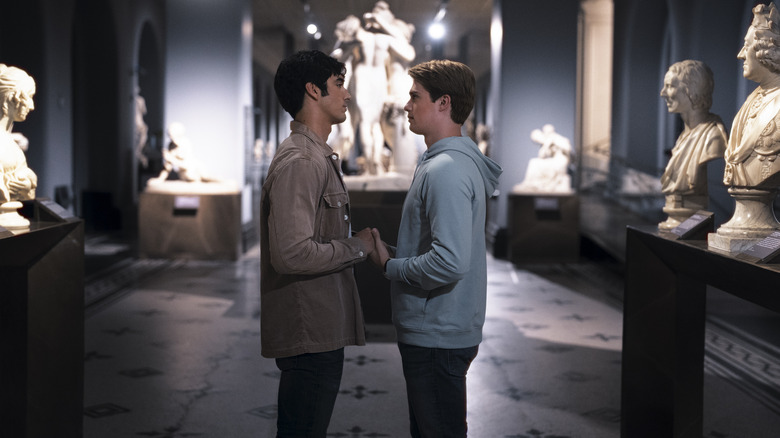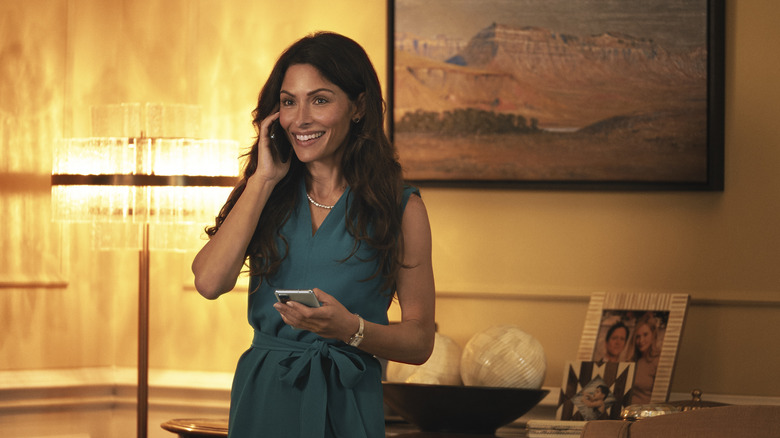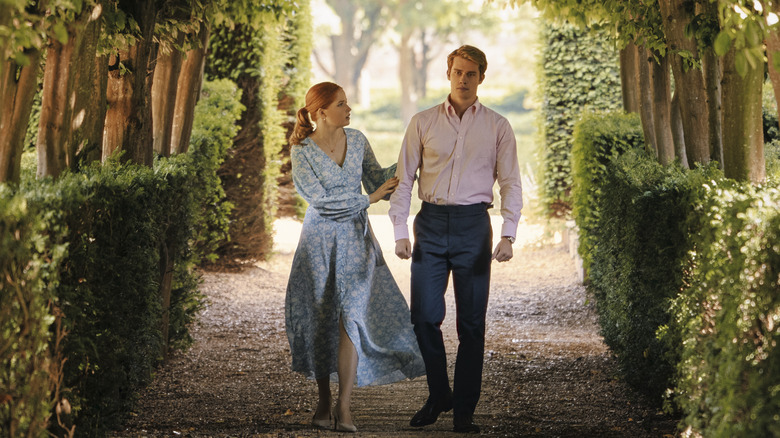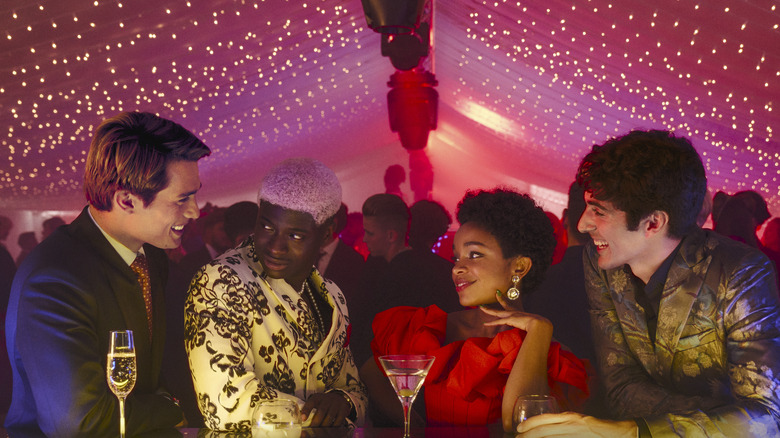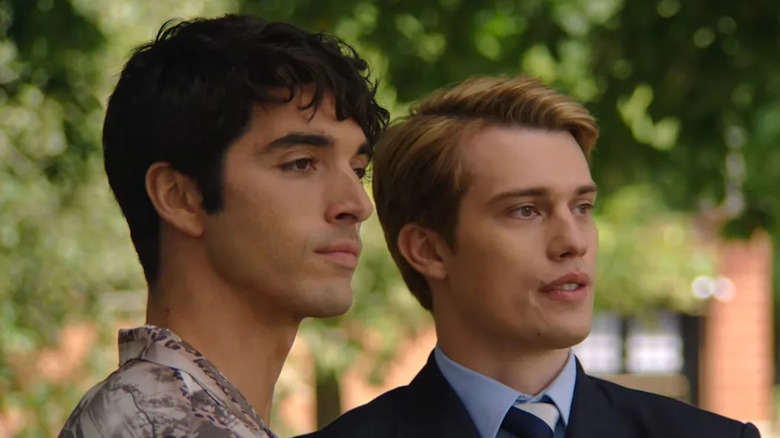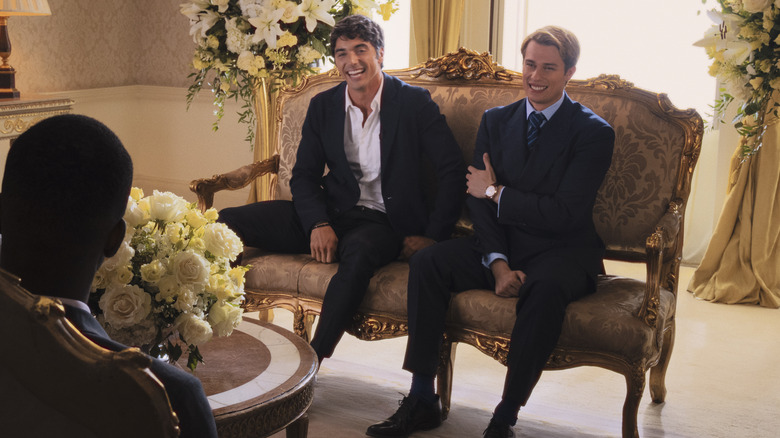Red, White & Royal Blue: What Changed From Page To The Screen?
Adapting any novel to the big screen is extremely difficult, but taking a 448-page queer romantic love story and turning it into a two-hour movie is nothing short of a Herculean task (and that's to say nothing of the book's special edition, which is even longer). This is the challenge director Matthew Lopez, known for his Tony Award-winning play "The Inheritance," faced while adapting Casey McQuiston's beloved novel "Red, White & Royal Blue," which tells the story of a fictitious Prince of England and First Son of the United States who fall madly in love and ultimately have to navigate a geopolitical firestorm over their relationship.
Lopez spoke to Entertainment Weekly about the difficulties of adaptation as a whole before the film's release, and while he worked hard to make sure he stayed true to McQuiston's story, he also had to make some necessary changes. "[The biggest challenge was] quite simply how to delivery Casey's story in a way that honored the novel but that didn't result in a three-hour film," Lopez told the outlet. "There are a lot of wonderful scenes and characters in the book that didn't make it into the film because they didn't fit. I don't regret any of those decisions but, as a fan of the book, they weren't easy to make."
So what made it into the movie, and what changed? Here's what you need to know about the differences between the book and film versions of "Red, White & Royal Blue."
A bunch of major characters were cut from the movie
Sometimes characters and scenes find their way to the cutting room floor, just like Lopez said — but some of the movie's omissions are really, really tough losses. First up is June Claremont-Diaz, sister to that lovelorn First Son Alex Claremont-Diaz (Taylor Zahkar Perez). As Alex affectionally calls her, "Junebug" is named for June Carter Cash and is not only Alex's fiercest ally and best friend, but a brilliant writer who often helps out her mother, President Ellen Claremont (Uma Thurman) with campaign speeches and fundraising. Alex isn't the only one missing a family member; his boyfriend Prince Henry (Nicholas Galitzine) mentions his late father and it seems like his mother, Catherine, is still alive. She doesn't appear in the movie, though, whereas in the book she goes to bat for her son against the monarchy when his relationship with Alex is publicized without their consent.
Rafael Luna, another huge omission, is, within the book's narrative, the first openly gay Senator who serves as a mentor to Alex and is also a part of Alex's public outing (but more on that in a bit). Some smaller cuts include Ellen Claremont's second husband, Leo; in the book, she's divorced from Alex and June's father Oscar Diaz, but in the film, the two are still married and Oscar is played by Clifton Collins Jr. Finally, Alex's high-school buddy Liam, with whom he briefly hooked up while exploring his sexuality, is nowhere to be found in the finished film.
A queen becomes a king
From Alex's perspective, the time to go public about his relationship with Henry is clear: once his mother's re-election campaign is over, whether she wins or loses the presidency, he'll be able to tell the world about Henry. For Henry, it's not as clear, as he has to contend with the famously conservative British monarchy. Even though he's not the direct heir to the throne — as the old and rather callous saying goes, he's the "spare," not the "heir," with his older brother Prince Philip (Thomas Flynn) directly in line ahead of him — Henry still, as he puts it, "belongs to Britain."
When their relationship is revealed through tabloid reports and intimate emails between them leak on Reddit, Alex and Henry have to stand firm and face down not just Philip, but the reigning monarch of England. In the book, Queen Mary, mother to Henry's own mother Catherine, is the one who suggests that the Crown could pretend the emails between Alex and Henry and long-range photos are faked, yet in the film, Queen Mary is replaced by King James III, played by British legend Stephen Fry. It's unclear as to why this changed, but in any case, Fry — who, like the Queen in the novel, eventually accepts and stands behind his grandson — is a welcome addition to the movie's cast.
Nora and Alex's story changes entirely
Without June in the movie, the role of Alex's confidant falls to Nora Holleran, the granddaughter of the unseen Vice President Mike Holleran. Played by Rachel Hilson, Nora is Alex's best friend, and after Henry kisses him for the first time, it's her counsel she seeks; after that, she strikes up her own romance with Henry's best friend Percy (Malcolm Atobrah).
There are a few changes here that need to be noted. First of all, in the book, Nora and Alex have a romantic history, and they tend to put rumors about other relationships to bed by going on "dates" with each other and faking dalliances in hotel rooms (Alex recalls online shopping and watching "The West Wing" with Nora once when paparazzi fully expected them to be doing a lot more). They're just best friends, but they've also been intimate, and it's Nora that Alex kisses in front of Henry on New Year's Eve, making Henry wildly jealous and leading up to that kiss. Besides that, Nora is specifically revealed to be bisexual, and not only does she have romantic moments with Percy, but she also has them with June; in fact, it's heavily implied that the three of them are intimate. Nora's character is seriously downplayed in the movie, which makes some sense, but it's still a bitter pill to swallow considering that we could have seen a depiction of a second major queer character in the film.
Alex and Henry are both definitely older in the film
In the book, Alex and Henry are... really young, especially when you consider that the story leads to them spending the rest of their lives together and eventually getting engaged. (That part is in the aforementioned extra chapter in the special edition, sure, but they repeatedly say that they "feel forever" about each other.) Alex is just 21 at the start of the novel and turns 22 during the timeline, and Henry is 22, ultimately turning 23.
The book has Alex graduating from college, but in the film, he's already in law school — a goal he only imagines during the book — and he ends up graduating with a J.D. Neither Henry nor Alex's ages are specified, but it's quite clear that they're older, and the actors are older than the original characters as well (as of this writing, Zakhar Perez is 31, and Galitzine is 28). Similar to some of the other changes Lopez and his co-writer Ted Malawer made, it's not completely clear as to why Alex and Henry are older than they are in the book, but it could be due to the film's more intimate scenes. "Red, White & Royal Blue" doesn't shy away from showing Alex and Henry's sexual relationship, which is true to the book, so maybe the filmmakers thought both parties should be slightly more mature.
A new character, Miguel, is pivotal to the plot
Remember Rafael Luna, the major player in the book who doesn't show up in the movie? In the middle of McQuiston's novel, Luna abruptly goes to work for the Richards campaign, the Republican opposing President Claremont, blindsiding Alex, Oscar, and his entire family — especially considering that Alex worked to help Luna get elected to the Senate and considered him both a mentor and a friend. Ultimately, it comes out that Luna only joined Richards so that he could expose Richards as a sexual predator, because Richards targeted him years prior, and he provides Nora and the Claremont campaign with damning evidence proving that Richards outed both Alex and Henry by leaking their private correspondence.
The new character standing in for Rafael is Miguel, who accomplishes two things at once: he reveals Alex's history with men and outs Alex and Henry's relationship. A journalist who once hooked up with Alex, Miguel is interested in seeing Alex again, but after he leaks Claremont campaign information, Alex brutally rejects his advances. After that, he hacks into Alex and Henry's emails, telling MSNBC's Joy Reid (playing herself) that he was able to write the story so quickly because he's just that good at his job. The movie doesn't really circle back to the fact that Miguel is the culprit, so unfortunately, replacing Rafael Luna with another queer Latino character doesn't really carry the same weight.
